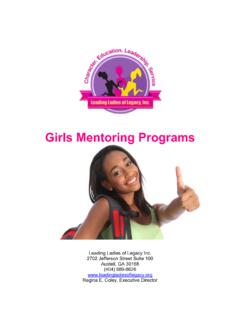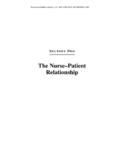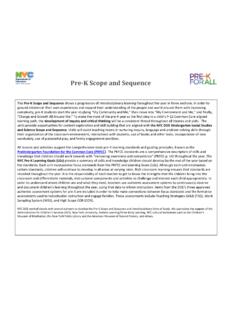Transcription of Food and Drink Policy and Procedure - Wigan Council
1 Food and Drink Policy and Procedure Where children are provided with meals, snacks and drinks , they must be healthy, balanced and nutritious. EYFS 2017 ( ). Mealtimes should be a happy, social occasion for children; with positive interactions shared and enjoyed. I am committed to offering children healthy, nutritious and balanced meals and snacks which meet their individual needs and requirements. To meet the requirements of the Early Years Foundation Stage and the Childcare Register, I must: Obtain information about any special dietary requirements, preferences and food allergies that your child has, and any special health requirements, before the child starts at my setting. Make parents aware of the 14 food allergens and how I record ingredients in the meals and snacks that I provide for children. I will make parents aware of the need to inform me of the ingredients in the food contained in any packed lunches or snacks that they supply for their child.
2 Make sure fresh drinking water is available and accessible at all times. Promoting children's independence where possible. Record and act on information from you about your child's dietary needs. Make available menus and information about the food and drinks that I. provide for your children. Notify Ofsted of any food poisoning affecting two or more children looked after on the premises within 14 days. The Voluntary Food and Drink Guidelines for Early Years Settings in England' has been developed to help early years settings meet the EYFS Safeguarding and Welfare Requirements. Guidance to provide healthy, balanced and nutritious food and Drink . I will ensure that: My care promotes the good health of children. Children are provided with meals, snacks and drinks that are healthy, balanced and nutritious. Children know the importance of a healthy diet for good health. Involve children in the preparation of food.
3 I make children aware of 14 allergens where appropriate. I plan varied menus for meals and snacks to include different tastes, colours and textures of food. Please see my sample menu. Portion sizes will take account of the age of the children being catered for. I have a positive and welcoming eating environment to encourage children to eat well, and develop good eating habits and social skills. The children and I wash our hands before the preparation of food and eating. Produced May 2014. Reviewed Review Date June 2016. Reviewed August 2017 Page 1 of 3. Review Aug 2017 or when regulations change I cater for the dietary requirements of all children, ensuring that any food allergies/intolerances are catered for, as well as children from all cultures and religions being able to enjoy appropriate meals and snacks. I will have recorded this information on the child record' form. Cultural differences in eating habits and the different ways people eat their food will be respected.
4 Meet the principles laid out in the Early Years Code of Practice for Food and Drink ', which is displayed. Food is never used as a punishment, or as a reward. Ensure adequate equipment including seating arrangements, cutlery is available for all children attending my setting. Register with the Local Authority Environmental Health Department, and have completed the Level 2 Food Hygiene Course on (insert date). _____. My setting is suitable for the hygienic preparation of food, and where appropriate, suitable sterilisation equipment for babies' food. I am competent to prepare and handle food. Have requested a Safer Food Better Business pack for childminders from the food standards agency on (insert date) _____. Be compliant with completing checks and risk assessments relating to the preparation and storage of food. (Follow the guidance within Safer Food Better Business packs and complete daily risk assessments within the pack.)
5 It is important that children are given the opportunity to celebrate special occasions and cultural events, and food and Drink is often used to mark these occasions. I will ensure that healthy options are provided. Learning about and through food It is a requirement under Learning and Development that I help children understand the importance of making healthy choices in relation to food. I do this through the seven areas of learning: Learning about food is an important part of children's development and is integrated into the seven areas of learning. The examples given below show how learning about and through food can be linked to the Early Years Foundation Stage (EYFS). Personal, social and emotional development Meal times offer children experiences to taste different foods, overcome dislikes and learn how to share. Sitting around a table eating food together is a good way to teach social skills.
6 Cooking activities offer opportunities for learning through working with others and increasing self-esteem. Physical development Fine and gross motor skills can be developed through activities such as using knives and forks, preparing food, and washing up. Mealtimes can be used to help children to make healthy food choices. Produced May 2014. Reviewed Review Date June 2016. Reviewed August 2017 Page 2 of 3. Review Aug 2017 or when regulations change Communication and language Sitting around a table eating food together is a good way to teach conversation. Language can be developed and senses explored through discussing and describing the taste, texture, size, look and smell of food. Literacy Many stories involve food. They can teach children about ingredients, where food comes from and about food for special occasions and from different cultures. Mathematics Activities such as counting out spoons and pieces of fruit when setting the table or at snack time can be used to support numeracy skills.
7 Sorting and matching foods into different types can help promote organisational skills and reasoning. Understanding the world Food tasting activities teach children about ingredients, the seasons and where food comes from including food from different cultures. Growing fruit and vegetables teaches children about where food comes from, about life cycles, about gardening and how to look after plants. Many vegetables and herbs can be grown on window sills and in pots or bags, which children can be involved in. Expressive arts and design Art activities can engage children with food and alert them to colours and shapes. (Adapted from the Voluntary Food and Drink Guidelines for Early Years Settings in England A Practical Guide). Name of Childminder: .. Signature of Childminder .. Date: . Produced May 2014. Reviewed Review Date June 2016. Reviewed August 2017 Page 3 of 3. Review Aug 2017 or when regulations chang











